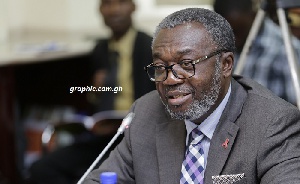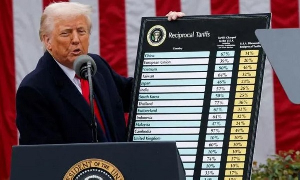Dr Anthony Nsiah Asare, the Director General of the Ghana Health Service (GHS), has challenged biomedical engineers to be innovative in their management and repairs of equipment to eliminate the huge wastage within the health sector.
He said there was too much wastage in terms of broken down equipment, majority of which did not have spare parts for replacement or repairs, which ended up becoming ‘white elephants’ with no hopes of ever being used.
This, he said, constituted a drain on the health sector budget, adding that a health system without proper repairs and management of equipment was an ailing one, which had dire consequences on patient safety.
He suggested that to minimise the wastage professionals could, for example, make use of working parts from similar broken down equipment to fix others, rather than waiting for replacements or general repairs of all.
Dr Nsiah Asare threw the challenge at the opening of the maiden National Conference of the Ghana Society of Biomedical Engineers (GSBE) in Accra on the theme: “Biomedical and Healthcare Engineering - The Practice and Impact in Ghana”.
He said although Biomedical Engineering was a relatively new area of practice within the healthcare delivery system, it had played key roles in the management of sophisticated technological equipment to ensure patient safety and wellbeing.
He congratulated the GSBE for its immense contributions to the health sector, saying although very young, it had helped in overcoming some of the challenges in handling medical equipment and consumables to ensure quality healthcare.
Dr Nsaih Asare noted that although these professionals had gained much education in their field of study, they lacked training in equipment management, and suggested that this be included in their training at the university level.
He advocated for continuous professional training to be abreast of changing trends and pledged the support of the GHS towards this cause.
Dr Nsiah Asare said the Government’s ‘One District One Factory’ project would also provide industrial advancements and opportunities that could help in resolving some of the challenges such as the manufacturing of spare parts and medical consumables.
He urged the engineers to take advantage of the opportunity when the time came to help address the problems of equipment and other technological imputes.
The GHS would soon commence an equipment audit in all public health institutions across the country to take inventory of what were working and not working, and also ensure that there were biomedical engineers in all regional and district hospitals to ensure constant management.
Dr Nsiah Asare said the Ministry of Health would soon initiate processes to ensure the policy regulation of biomedical engineering practices in Ghana, as this was non-existent.
Mr Kingsley Aboagye Gyedu, the Deputy Minister of Health, said the work of biomedical engineers was crucial as quality healthcare delivery depended on their ability to keep diagnostic equipment and other medical consumables in good shape for effective outcomes.
He said doctors relied on such diagnostic results to be able to prescribe appropriate treatment therapies for their patients, yet such capital intensive equipment often suffered breakdowns and were often rendered useless due to lack of spare parts.
He said achievement of the Sustainable Development Goal (SDG-3), which aims at improving the wellbeing of the people, would ensure the development of professionals in the health sector, efficiency and patient safety.
Dr Polycarp Reccy Asman, the Chief Executive Officer of Medwise International Company Limited, said the professionals could ensure competency through the constant exploration of innovative ideas, skills and practices to help address the challenges of equipment management.
He said about 40 per cent of maintenance problems happened at the procurement levels, but since expert opinions were often not sought for, those equipment were installed and many never functioned properly or worked at all, leaving the local professionals in serious dilemmas with no means to repair them.
Mr James Blankson Aidoo, the Acting President of the GSBE, explained that the conference is to take stock of the Society’s activities so far, elect new national executives and also launch the Biomedical Engineering Professional Development Training, which was being sponsored by the General Electric Foundation and Assist International.
General News of Saturday, 9 September 2017
Source: ghananewsagency.org













